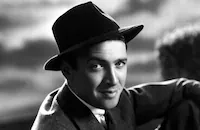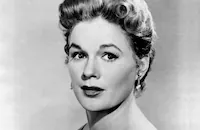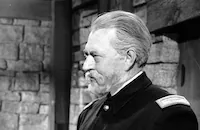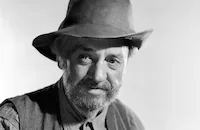Carbine Williams

Brief Synopsis
Cast & Crew
Richard Thorpe
James Stewart
Jean Hagen
Wendell Corey
Carl Benton Reid
Paul Stewart
Film Details
Technical Specs

Synopsis
While on a business trip to the Winchester Repeating Arms Company in New Haven, Connecticut, preeminent gun designer Marsh Williams is urgently summoned home to North Carolina by his wife Maggie. Once there, Marsh learns that his young son David has been the victim of vicious schoolyard gossip targeted at Marsh. To explain the situation to David, Marsh turns to his old friend Capt. H. T. "Cap" Peoples, the warden at Central Prison, North Carolina. Marsh drives David to the prison to meet Cap, and there Cap explains that Marsh was convicted of murder and recounts the story of his incarceration: As a boy, Marsh, a rugged individualist and one of eleven children, impetuously quits school to join the Navy. After several hitches, Marsh is discharged and returns home to marry Maggie, his boyhood sweetheart. When Marsh asks his strict father Claude for his share of the family farm, Claude sternly declares that Marsh must work for two years to prove that he deserves the land. Impatient, Marsh renounces his claim to the property and takes a menial job laying railroad tracks so that he can afford to marry Maggie. To supplement his meager income, Marsh builds a distillery with fellow moonshiners Redwick Karson and Sam Markley. When one of the local moonshiners is killed by revenue agent Jesse Rimmer, Marsh warns Rimmer to stay away from him. Marsh continues to expand his business, telling Maggie that his newfound prosperity is due to his hard work at the railroad, until one day a still explodes, severely scalding him. When Maggie learns that Marsh has been lying to her, she threatens to leave him unless he stops moonshining. Soon after, revenue agents come to the distillery to arrest Marsh, sparking a gunfight between the moonshiners and the agents. Marsh escapes into the woods, and later, Maggie finds him in their secret hiding place and informs him that Rimmer was killed in the shootout. When Maggie swears to stand by Marsh, he turns himself in and is arrested for murdering the agent, even though several other men participated in the fatal gunfight. Once the jury returns a deadlocked verdict, Claude demands a second trial for his son and the state offers a reduced charge of second degree murder. After accepting the state's offer, Marsh is sentenced to thirty years of hard labor. Bitter, Marsh refuses to communicate with his family. One day, in the prison yard, several prisoners stab an informer, and although Marsh refused to participate in the attack, he is sentenced to work on the chain gang with the others. After doing his time on the brutal chain gang, Marsh is transferred to the Caledonia Prison Farm, where he meets Capt. Peoples, the warden there. Although Maggie writes Marsh regularly, he discards her letters without reading them. Maggie complains to the warden about her husband's unresponsiveness, Cap summons Marsh to his office and orders him to respond to his wife's letters, but Marsh sullenly challenges his authority. While working in the fields one day, Marsh grabs Cap's gun to shoot a rattlesnake that is about to strike. When Marsh voluntarily relinquishes the weapon, he begins to win Cap's respect. Soon after, "Dutch" Kruger, one of Marsh's bunk mates, suffers a debilitating bout of malaria, and when Marsh stays behind to take care of him, Cap punishes him for being late to dinner and sentences him to solitary confinement until he recognizes the warden's authority. Marsh defiantly holds out for thirty days until the prison doctor authorizes his release. Afterward, Cap summons Marsh to his office and tells him that Maggie is waiting outside to see him. After Cap grants Marsh a twenty-four hour leave to spend with his wife, Marsh begins to respect the warden. On a picnic with her husband, Maggie reaffirms her love and then tells Marsh that she wants to have his child. When Marsh returns to prison on time, Cap honors his request to work at the blacksmith shop. After Marsh starts to sketch the design for a rifle he conceived of during his long days in solitary, Cap reluctantly allows him to continue his drawing. In secret, Marsh builds his gun in the prison workshop, and one day, Dutch and another inmate try to steal it to use in a prison break. Although Marsh successfully resists them, Cap is furious that Marsh actually built the weapon. When Marsh explains his revolutionary design for a new, light automatic rifle, however, Cap, impressed, allows him to continue work on the gun and writes Maggie that Marsh's determination has changed him. Marsh becomes a model prisoner, and six years later, finally perfects his rifle. When newspaper headlines trumpet the story of a convicted killer who builds guns in prison, Cap and Marsh are called before the prison board to defend themselves. After Cap defends Marsh's right to test his gun and offers to complete the convict's sentence if he tries to escape, the board, impressed, grants him permission. Once the gun is successfully tested, Joseph Winchester, the head of Winchester rifles, offers Marsh a contract. Several months later, with his father and Cap's support, Marsh is pardoned by the governor. His story finished, Cap returns to the present and concludes that Marsh's designs revolutionized the automatic rifle, a weapon that helped win the war for the U.S. With new respect, David then runs into his father's arms.

Director

Richard Thorpe
Cast

James Stewart

Jean Hagen

Wendell Corey

Carl Benton Reid

Paul Stewart
Otto Hulett

Rhys Williams
Herbert Heyes

James Arness

Porter Hall
Fay Roope
Ralph Dumke

Leif Erickson
Henry Corden
Frank Richards
Howard Petrie
Stuart Randall
Dan Riss
Bobby Hyatt

Willis B. Bouchey
Emil Meyer
Lillian Culver
Harry Cheshire

Jonathan Hale
Robert Foulk
Ralph Smiley
Louis Nicoletti
John Maxwell

James Davis
Norma Jean Cramer
Marlene Lyden
Harry Mackin
Jordan Cronenweth
Robert Van Orden
Truman Herron
Tony Epper
Jon Gardner
Fred Kohler
Bob Alden
John Mckee
Duke York
David Mcmahon
Richard Reeves
Bert Lebaron
James Logan
Paul Kruger

Bob Wilke
Wade Crosby

Lee Phelps

Emmett Vogan
Roy Butler
Michael Dugan
Fiona O'shiel
Watson Downs
Ken Christy
Leonard Strong
James Cronan
Roy Engel
Robert W. Wood
Billy Dix
Robert Stephenson
Harry Hines
Doug Carter
Charles Horvath
Guy Wilkerson
James Harrison
Jimmy Ames
Dick Rich

John Doucette
Sam Flint
Nolan Leary
Marshall Bradford
George Pembroke
Marliee Phelps
James A. Robertson
Gene Roth
William Vedder
Baynes Barron
George Lloyd
Margaret Brayton
Rick Ryan
Erik J. Nielsen
Bennie Washington
Crew
Neal Beckner
Art Cohn
Armand Deutsch
Howard Dietz
Cedric Gibbons
A. Arnold Gillespie
Johnny Green
Sydney Guilaroff
Eddie Imazu
Al Jennings
Newell P. Kimlin
William Mellor
Bob Moreno
Warren Newcombe
Ralph Pender
Walter Plunkett
Bill Riley
Conrad Salinger
Douglas Shearer
Alfred E. Spencer
Bill Thomas
William Tuttle
David Marshall Williams
Edwin B. Willis

Videos
Movie Clip


Film Details
Technical Specs

Articles
Carbine Williams
Stewart's initial foray into darker material was in the Anthony Mann-directed western Winchester '73 (1950), followed shortly by Carbine Williams in 1952. In addition to giving Stewart's screen image a harder edge, the studio deal that put Stewart into the role in the first place proved to be far more important for his career. When Stewart was lobbying with Universal Pictures to play the lead role in their upcoming Harvey (1950), Universal agreed as long as he signed on to do another picture under the Universal logo. That second picture turned out to be Winchester '73. But Universal was experiencing some financial troubles at the time and they were unable to pay Stewart's asking price of $200,000 for either film. Therefore, Lew Wasserman, Stewart's agent, negotiated a deal whereby the mega-star would be a partner in the making of Winchester '73, taking no salary but splitting the profits. This deal proved to be enormously profitable for Stewart and it allowed him greater creative control for future pictures. Thus, when he went to MGM to star in the life story of David Marshall Williams, it was not too difficult to accept him as an embittered prisoner, nor was it too much of a financial risk for Stewart or MGM. But more than just a portrayal of a convicted killer, Carbine Williams was the inspiring true story of Williams' efforts to invent the M1 rifle, a successor to the Winchester rifle and the weapon that revolutionized modern warfare. More than 8 million carbines were used by American troops in World War II, thanks to the tenacity and inventiveness of "Carbine" Williams.
Director: Richard Thorpe
Producer: Armand Deutsch
Screenplay: Art Cohn
Cinematography: William Mellor
Editor: Newell P. Kimlin
Art Direction: Cedric Gibbons, Eddie Imazu
Music: Conrad Salinger
Cast: James Stewart (Marsh Williams), Jean Hagen (Maggie Williams), Wendell Corey (Capt. H.T. Peoples), Carl Benton Reid (Claude Williams), Paul Stewart ('Dutch' Kruger).
BW-94m. Close captioning.
by Scott McGee

Carbine Williams
Quotes
Trivia
Notes
The film's working titles were The Story of David Marshall Williams and Man with a Record. The film's opening title card reads: "Metro-Goldwyn-Mayer presents James Stewart as Carbine Williams." A written prologue reads: "The March, 1951 issue of Reader's Digest published an article in its series, "The Most Unforgettable Character I've Met." That character is David Marshall Williams-- and this is his story as he lived it." Although not credited onscreen, Capt. H. P. Peoples was the author of the Reader's Digest article. The film concludes with the following written acknowledgment: "Metro-Goldwyn-Mayer gratefully acknowledges the cooperation of the North Carolina prison authorities and wishes to state that the penal system existing in North Carolina today has been improved immeasurably over conditions depicted in the picture." According to Hollywood Reporter news items, Janet Leigh was initially set to co-star in the film as "Maggie Williams" and Miklos Rozsa was to do the film's score. A Hollywood Reporter news item includes Philo Herrick in the cast, but his appearance in the released film has not been confirmed.
As in the film, David Marshall Williams (1900-1975) invented a new type of rifle mechanism which became the centerpiece of a lightweight rifle, called the "Carbine." The rifle was used extensively by the United States Army during World War II, and variations of his designs continue to be used by the Army to the present day. The original rifle, and others that followed it, utilized a short-stroke piston. Williams' invention was developed while he was serving a thirty-year prison sentence for murder in the Caledonia maximum security farm in North Carolina. According to modern sources, after the film had its premiere in Fayetteville, friends and neighbors gave Williams a new nickname, "Carbine." Modern sources also state that many supporters maintained that Williams was not responsible for the death of Deputy Al Pate. Wendell Corey and Jean Hagen recreated their roles for a Lux Radio Theatre presentation of Carbine Williams, with Ronald Reagan in the title role, on March 22, 1954.














